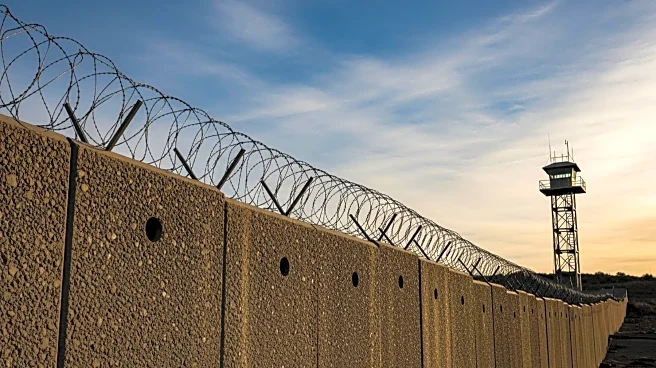What's Happening?
Kurdish counter-terrorism officials have reported a significant resurgence of Islamic State (IS) activities in north-eastern Syria. According to Siyamend Ali, a spokesman for the People's Protection Units
(YPG), there has been a tenfold increase in IS attacks, attributed to the security vacuum following the ousting of Syria's former dictator Bashar al-Assad. The YPG, a Kurdish militia and a key component of the Syrian Democratic Forces (SDF), has been combating IS for over a decade. The resurgence has led to increased operations by IS, including attacks on checkpoints and the planting of landmines. Kurdish authorities are currently detaining approximately 8,000 suspected IS fighters from various countries in a network of prisons, with the largest being al-Sina in Al Hasakah.
Why It's Important?
The resurgence of IS activities in Syria poses significant security challenges for the region and international stakeholders. The Kurdish forces, while being a crucial ally to the U.S. in the fight against IS, face the dual challenge of managing detained IS fighters and countering active cells. The increase in IS attacks could destabilize the region further, impacting humanitarian efforts and potentially leading to a broader conflict. The situation also highlights the complexities of international relations, as the YPG is considered a terrorist group by Turkey, complicating regional dynamics.
What's Next?
The Kurdish authorities are likely to continue their efforts to contain IS activities, but the situation may require increased international support and cooperation. The U.S. and other allies might need to reassess their strategies in the region to prevent further escalation. Additionally, the handling of detained IS fighters remains a contentious issue, with human rights groups criticizing the indefinite detention without trial.
Beyond the Headlines
The ongoing conflict and detention of IS suspects raise ethical and legal questions about the treatment of detainees and the long-term strategy for dealing with IS affiliates. The potential for radicalization within detention facilities and the impact on children growing up in these environments are significant concerns that need addressing.









